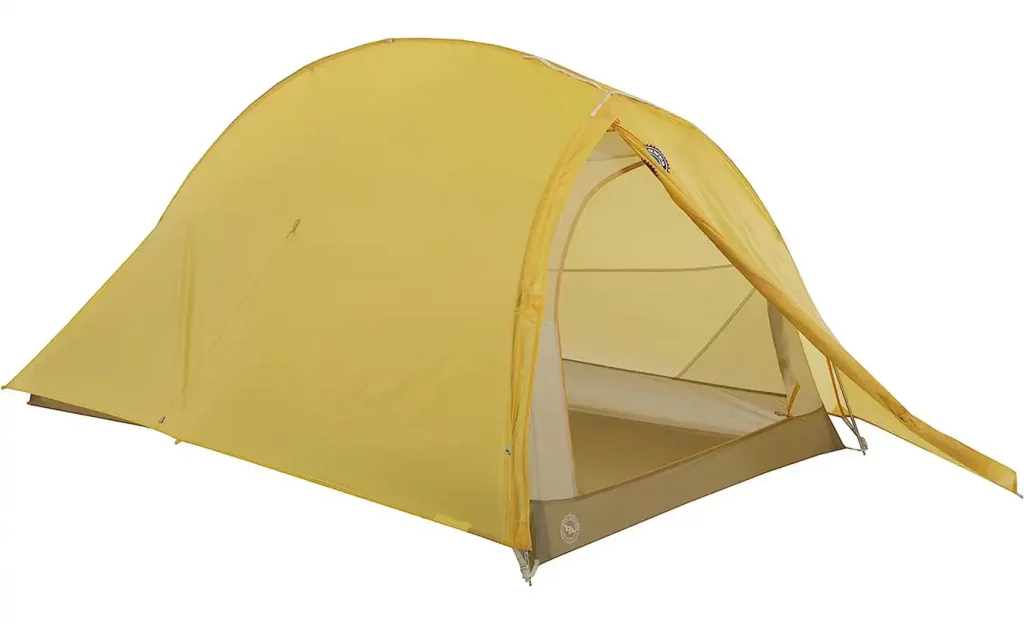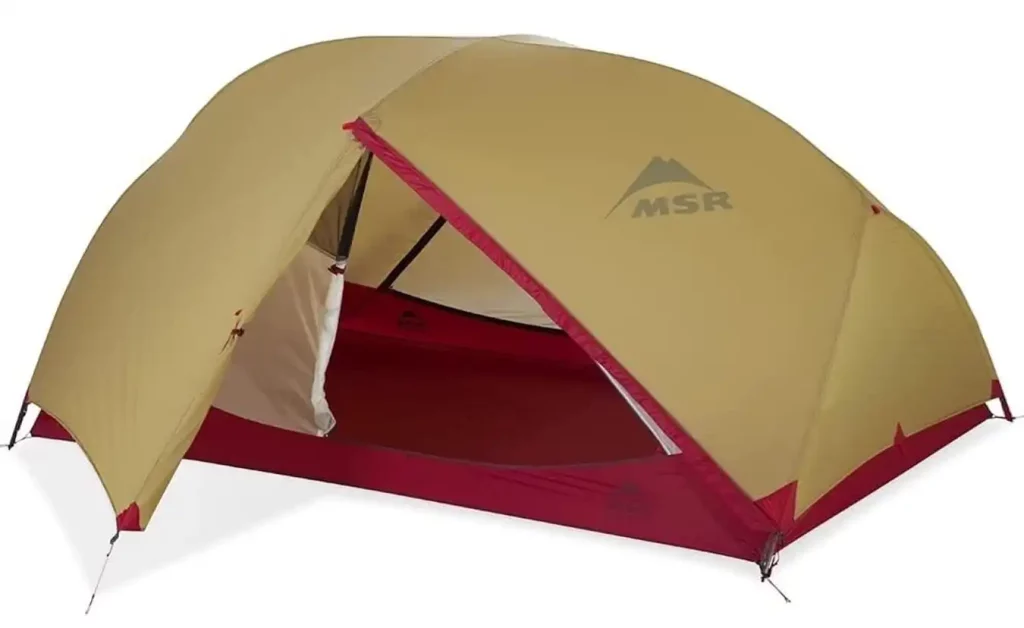“How much does a tent weigh?” You might find yourself asking this before a hiking trip or festival weekend.
It's not just about numbers, but the balance between comfort and portability.
Navigating the tent market can feel like a maze, with so many options and specs.
They're a world of their own with a myriad of factors affecting their heft.
In this article, we'll sift through those details, giving you the lowdown on what to expect on the scales.
By the time you finish, tent weights won't be a guessing game anymore.
Let's get to the bottom of this.
The Spectrum of Tent Weights
A stroll down any camping supply aisle will reveal a bewildering array of tents, each with its unique set of features, design, and most importantly, weight. The weight of a tent can vary tremendously, ranging from ultra-light options to heavier, more robust family or expedition tents.
Understanding this spectrum of tent weights is crucial for choosing the right one for your next outdoor adventure. Let's delve into the different categories.
On the Lighter End: Ultralight and Backpacking Tents
For the unencumbered adventurers who prioritize mobility and speed, ultralight and backpacking tents are the go-to choice. These tents are meticulously designed to trim every possible ounce, often weighing under 3 pounds for a 1-2 person tent.
They achieve this remarkable feat through minimalist designs, lightweight materials, and smaller footprints.
For example, the Big Agnes Fly Creek HV UL2 from Amazon, a popular choice among thru-hikers, weighs just 2 pounds and 2 ounces. Ultralight tents like this are made from high-tech materials such as Dyneema Composite Fabrics or featherweight nylon, which offer excellent strength-to-weight ratios.

The Middle Ground: 3-Season Tents
3-season tents strike a balance between durability, weather resistance, and weight, making them the jack-of-all-trades in the tent world. Weighing generally between 4 to 8 pounds, they are designed to withstand the conditions of spring, summer, and fall, hence the name “3-season”.
A typical 3-season tent, such as the REI Co-op Half Dome 2 Plus, weighs around 4 pounds and 14 ounces. While it’s not as lightweight as an ultralight tent, it offers more living space and weather protection, making it an excellent choice for those prioritizing comfort without breaking their backs.
Heavy Hitters: Family and Expedition Tents
At the heavier end of the spectrum, you'll find family and expedition tents. These hefty shelters, often weighing 10 pounds or more, are designed for maximum comfort, space, and resilience against harsh weather conditions.
Take the Eureka! Copper Canyon LX 4 as an example of a family tent. Weighing in at a whopping 18 pounds, it's essentially a portable cabin, complete with near-vertical walls and room dividers for privacy. Meanwhile, expedition tents like The North Face 2-Meter Dome, weighing around 49 pounds, are engineered to endure extreme weather conditions at high-altitude mountaineering expeditions.
Why Tent Weight Matters
Impact on Backpacking and Camping Experience
The weight of your tent plays a significant role in determining your backpacking or camping experience. A lighter tent can make the difference between a pleasant, invigorating hike and an exhausting trek. On the other hand, heavier tents (like 4 season tents) can provide a high level of comfort, making them ideal for more relaxed camping trips where the weight isn't a concern.
For example, imagine you're planning a week-long hike in the Appalachian Trail. An ultralight tent would be your best companion here. The reduced weight can significantly decrease your pack's overall weight, making your journey more comfortable and enjoyable.
Balance Between Comfort and Convenience
It's crucial to find the right balance between comfort and convenience when choosing a tent. Lighter tents are undoubtedly more comfortable to carry but may offer limited living space and lesser protection against harsh weather. On the flip side, while a heavier tent can provide ample space and robust protection, lugging it around on a long hike could prove strenuous.
For instance, if you're car camping with your family at a state park, a heavy family tent can afford you the luxury of multiple rooms and plenty of headspace. The minor inconvenience of hauling it from your car to the camping spot is far outweighed by the comfort it provides.
Factors Influencing Tent Weigh
There's more to tent weigh than just the size. Several factors come into play, determining how much a tent weighs. Let's unpack these factors one by one.
Size and Capacity of the Tent
Unsurprisingly, the size and capacity of a tent play a significant role in its weight. More room means more material, and more material equals more weight. A 2-person backpacking tent will typically be much lighter than a 6-person family tent. For example, the MSR Hubba Hubba 2-person tent from Amazon weighs only 3.4 pounds, while a Coleman WeatherMaster 6-person tent from Amazon weighs a heftier 34 pounds.

Materials Used in Construction
The types of materials used in the tent's construction also greatly affect the weight. Ultralight tents typically use lightweight, high-tech materials such as Dyneema, which is incredibly strong for its weight. On the other hand, heavier tents often use more robust, and therefore heavier, materials such as polyester or canvas for durability and weather resistance.
Tent Design and Features
The tent's design and features can also add to the weight. Simple, minimalist designs with fewer poles and components will weigh less than complex designs with additional features. For instance, a basic A-frame tent will generally be lighter than a dome tent with multiple poles and vestibules.
Tent Weigh Variations by Brands
Different tent manufacturers emphasize different aspects of tent design, resulting in variations in weight even among tents of similar size and capacity.
Big Agnes: Lightness in Design
Big Agnes is renowned for their focus on creating lightweight tents. Their tents, such as the Fly Creek and Tiger Wall series(Amazon), are constructed with ultralight materials and minimalist design, making them a favorite among thru-hikers and ultralight backpackers.
MSR: Balancing Durability and Weight
MSR (Mountain Safety Research) focuses on creating a balance between durability and weight. Their tents, like the Hubba Hubba and Elixir series, offer a blend of robustness, weather resistance, and manageable weight.
Coleman: Comfort over Lightness
Coleman, on the other hand, prioritizes comfort and space in their tents, making them heavier but also more comfortable. Their family tents, such as the WeatherMaster and Sundome series,from Amazon are spacious and packed with features, though they're less suited to carry on long hikes.
Comparing Popular Brands: A Tent Weigh Roundup
Let's compare the weight of some popular tents across these brands for a 2-person and 6-person capacity.
| Big Agnes (2-person) | MSR (2-person) | Coleman (2-person) | Big Agnes (6-person) | MSR (6-person) | Coleman (6-person) | |
| Model | Fly Creek HV UL2 | Hubba Hubba NX | Sundome 2 | Big House 6 | Habitude 6 | WeatherMaster 6 |
| Weight | 2 lbs 2 oz | 2 lbs 14 oz | 7 lbs 5 oz | 12 lbs 11 oz | 14 lbs 4 oz | 8.5 lbs |
These comparisons illustrate that tent weights can significantly vary between brands and depend on the focus of the brand's design principles.
Different Types of Tents and Their Weights
The tent universe is vast, with various types designed to cater to different camping needs. Let's navigate through some popular tent types and their average weights.
Backpacking Tents
Backpacking tents are designed to be lightweight and compact, with a focus on balancing weight, functionality, and durability. These tents are made from lightweight materials, use fewer poles, and are relatively simple in design. Average weight: 2-5 lbs.
Ultralight Tents
Ultralight tents, true to their name, prioritize weight reduction above all else. These tents are made with state-of-the-art materials like Dyneema and feature minimalist designs. Some ultralight tents even use trekking poles for support instead of traditional tent poles to save weight. Average weight: under 2 lbs.
Car Camping Tents
Car camping tents offer more space and comfort at the cost of increased weight. Since these tents are not intended to be carried long distances, manufacturers can include extra features like large doors, windows, room dividers, and higher peak heights. Average weight: 10-20 lbs.
Family or Basecamp Tents
Family or basecamp tents are the largest and heaviest of all. They are designed for longer stays and can accommodate multiple people, offering separate rooms and abundant living space. High peak heights, multiple doors and windows, room dividers, and a sturdy structure add to the weight. Average weight: 20-50 lbs.
| Type of Tent | Average Weight |
| Backpacking Tents | 2-5 lbs |
| Ultralight Tents | Under 2 lbs |
| Car Camping Tents | 10-20 lbs |
| Family/Basecamp Tents | 20-50 lbs |
Average Tent Weights
Let's now delve deeper into the average weights of tents, segregated by their capacity or use-case.
Single-person Tents
Single-person tents are compact and designed for solo adventurers. These tents typically have enough room for one person and their gear. Average weight: 1-3 lbs.
Two-person Tents
Two-person tents provide just enough room for two people to sleep comfortably. Some may offer extra room for gear storage. Average weight: 3-6 lbs.
Family Tents
Family tents, as the name implies, are designed to accommodate families or larger groups. They usually have room for 4-10 people and sometimes feature room dividers. Average weight: 15-50 lbs, depending on capacity.
Specialty Tents
Specialty tents, like mountaineering or expedition tents, are designed for specific environments or weather conditions. These tents are typically more robust, hence heavier. Average weight: 8-20 lbs.
| Type of Tent | Average Weight | Packed Size |
| Backpacking Tents | ||
| Single-person | 2-3 lbs | 4″ x 19″ |
| Two-person | 3-5 lbs | 6″ x 20″ |
| Ultralight Tents | ||
| Single-person | 1-2 lbs | 4″ x 18″ |
| Two-person | 2-3 lbs | 5″ x 19″ |
| Car Camping Tents | ||
| 4-person | 9-13 lbs | 8″ x 25″ |
| 6-person | 16-20 lbs | 10″ x 28″ |
| Family or Basecamp Tents | ||
| 4-person | 12-20 lbs | 9″ x 27″ |
| 6-person | 20-30 lbs | 11″ x 30″ |
| 8-person | 25-35 lbs | 12″ x 33″ |
While these weights are averages, keep in mind that the actual weight of your tent will vary based on the factors we discussed earlier, like the brand, materials used, and tent design.
In short, the weight of a tent can vary widely, typically ranging from 2 pounds for ultralight backpacking tents to over 20 pounds for large, heavy-duty family or basecamp tents.
Learn more: Best Tent for Motorcycle Camping
How to Determine the Weight of Your Tent?
Determining your tent's weight isn't as simple as it might seem. Different components of a tent contribute to its total weight. Let's dig deeper into the ways to determine your tent's weight.
Understanding the Different Weight Terms
Different weight terms are used to describe the weight of a tent. Here's what they mean:
- Packed weight: The total weight of everything that comes with your tent when you buy it, including stuff sacks, stakes, poles, and even the product tag.
- Trail weight (or Minimum weight): The weight of the essential components — tent body, rainfly, and poles. This is what you'll likely carry when backpacking.
- Fastpack weight: This is the weight of the tent stripped down to its bare essentials, often including the rainfly, poles, and footprint only.
Tools for Measuring Tent Weigh
If you want to measure the weight of your tent accurately, you might need to invest in a luggage scale. These scales are usually compact, easy to use, and can give you a precise measurement.
Impact of Tent Accessories on Total Weight
Tent accessories like footprints, gear lofts, or additional stakes can add up to the total weight. It's essential to factor these in if you're packing for a hike where every ounce matters.
| Term | Description |
| Packed weight | Weight of everything included with the tent |
| Trail weight | Weight of the tent body, rainfly, and poles |
| Fastpack weight | Weight of the rainfly, poles, and footprint |
| Accessories | Weight of additional items like stakes, footprints, etc. |
Tips for Managing Tent Weigh
Your choice of tent plays a crucial role in how much weight you're hauling. Here are some tips to manage the weight.
Opting for Lightweight Materials
Material choice can significantly affect the tent's weight. Lightweight materials like Dyneema or high-quality nylon can reduce weight without compromising durability.
Considering Minimalist Designs
Opt for tents with minimalist designs. These tents often use fewer poles and have fewer frills, which can save weight.
Effective Packing Strategies
Smart packing can also help reduce your load. Only take what you need, and consider items that can serve multiple purposes. Also, try to distribute the weight among your group if you're not traveling solo.
Ultimately, finding the perfect tent is a balancing act. You want something that suits your needs, whether that's being lightweight, durable, spacious, or all of the above. Make sure to weigh your options—literally—before setting off on your next adventure.
Expert Advice on Choosing the Right Tent
The weight of a tent is a vital factor, but it isn't the only one. Here's some expert advice to help you choose the right tent.
Considering the Purpose and Season
First, you must consider the purpose of your tent. Are you going on a solo backpacking adventure, or are you taking the family car camping? The use case will significantly affect your choice.
Similarly, you need to consider the season during which you'll be camping. Summer camping typically requires lightweight tents with good ventilation, while winter camping calls for sturdy, well-insulated tents.
Prioritizing Quality Over Weight
While it can be tempting to opt for the lightest tent, don't let weight be your only guide. Quality and durability are equally, if not more, important. A light tent that rips at the first gust of wind or leaks in a drizzle will do more harm than good.
Importance of Field Testing Before Trips
Before heading out on a major adventure, it's advisable to field test your tent. Try setting it up and sleeping in it overnight. This can help you get a feel for the tent's setup process, space, comfort, and suitability for your needs.
Read more: Pop Up Tent and How Do they Works
FAQs About Tent Weigh
How much does a 2 person tent weigh?
How much does a 1 person tent weigh?
How much does a 4 person tent weigh?
How much does an 8-man tent weigh?
Is a 5 pound tent too heavy?
How much does a 20x20 tent weigh?
How much weight for 10x10 tent?
Is 4 lbs too heavy for a backpacking tent?
How much does a Coleman 2 person tent weigh?
How heavy is the lightest tent?
Final Words
Tent weigh is an important consideration when planning an outdoor adventure. The weight spectrum of tents can vary widely, from ultralight backpacking tents that weigh under two pounds to large family tents that can weigh over 20 pounds.
Factors such as the tent's size, capacity, materials, and design all influence its weight. Different brands offer different weight variations, and knowing the typical weights of different types of tents can help guide your purchase.
But remember, while weight is crucial, it's not the only factor to consider. Always remember to consider the tent's purpose and the season you'll be using it in, prioritize quality over weight, and be sure to field test your tent before setting off on your adventure.
Choosing the right tent is a balancing act of various factors, but with careful consideration and preparation, you can find the perfect tent for your next outdoor adventure. Happy camping!
Learn more: Is Tent Camping Safe


